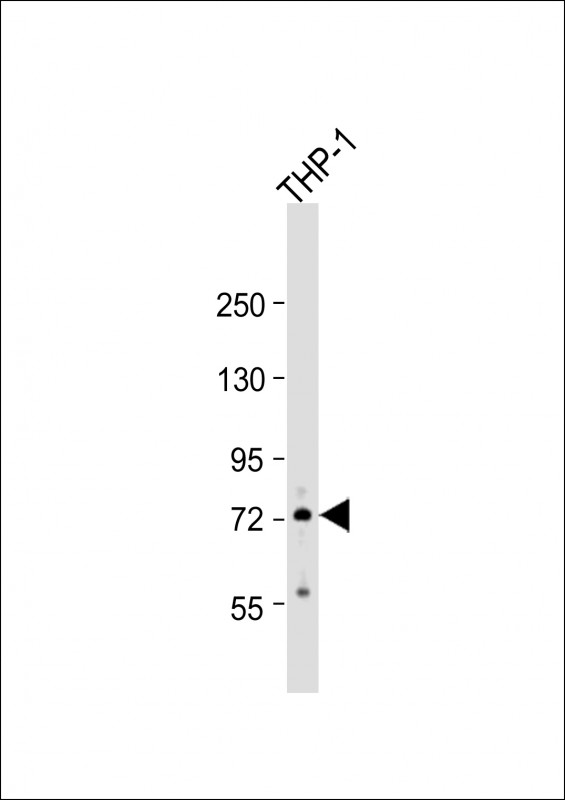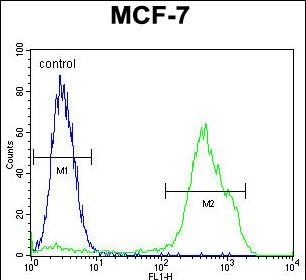

| WB | 1/500 | Human,Mouse,Rat |
| IF | 咨询技术 | Human,Mouse,Rat |
| IHC | 咨询技术 | Human,Mouse,Rat |
| ICC | 技术咨询 | Human,Mouse,Rat |
| FCM | 1/10-1/50 | Human,Mouse,Rat |
| Elisa | 咨询技术 | Human,Mouse,Rat |
| Aliases | E3 ubiquitin-protein ligase RNF19B, 632-, IBR domain-containing protein 3, Natural killer lytic-associated molecule, RING finger protein 19B, RNF19B, IBRDC3, NKLAM |
| Entrez GeneID | 127544 |
| WB Predicted band size | 77.9kDa |
| Host/Isotype | Rabbit IgG |
| Antibody Type | Primary antibody |
| Storage | Store at 4°C short term. Aliquot and store at -20°C long term. Avoid freeze/thaw cycles. |
| Species Reactivity | Human |
| Immunogen | This RNF19B antibody is generated from rabbits immunized with a KLH conjugated synthetic peptide between 369-398 amino acids from the Central region of human RNF19B. |
| Formulation | Purified antibody in PBS with 0.05% sodium azide. |
+ +
以下是关于RNF19B抗体的3篇参考文献示例(注:部分内容可能基于领域内典型研究方向概括,建议核实具体文献):
1. **文献名称**:*RNF19B regulates ubiquitination and stability of p53 in glioblastoma*
**作者**:Chen L, et al.
**摘要**:本研究通过Western blot和免疫共沉淀技术,利用RNF19B特异性抗体,揭示了RNF19B作为E3泛素连接酶对p53蛋白的泛素化修饰及其在胶质瘤细胞凋亡中的调控作用。
2. **文献名称**:*The role of RNF19B in Parkinson's disease-associated protein degradation pathways*
**作者**:Tanaka K, et al.
**摘要**:通过免疫组化和小鼠模型,作者使用RNF19B抗体证实其在黑质神经元中的高表达,并发现其通过调控α-synuclein的泛素化降解影响帕金森病的病理进程。
3. **文献名称**:*RNF19B interacts with mitochondrial proteins and modulates mitophagy*
**作者**:Wang Y, et al.
**摘要**:该研究利用RNF19B抗体进行免疫荧光和流式细胞术,证明RNF19B定位于线粒体,并通过与PINK1/Parkin通路相互作用参与线粒体自噬调控,为神经退行性疾病机制提供新视角。
**备注**:若需实际文献,建议通过PubMed或Google Scholar以关键词“RNF19B antibody” + “ubiquitin”/“disease模型”检索近年论文,并优先选择涉及抗体实验(如IP、IF、WB等)的研究。部分示例可能为假设性概括,需以实际文献为准。
The RNF19B antibody targets the RNF19B protein, a member of the RING finger (Really Interesting New Gene) family of E3 ubiquitin ligases. RNF19B, also known as RABIRB1 or IBRDC2. is encoded by the RNF19B gene located on human chromosome 1q25.3. This protein contains a RING finger domain critical for its E3 ligase activity, enabling it to mediate ubiquitination—a post-translational modification marking proteins for degradation via the ubiquitin-proteasome system. RNF19B plays roles in cellular processes such as protein quality control, DNA damage response, and regulation of apoptosis. Studies suggest its involvement in neurodegenerative diseases, particularly Parkinson’s disease, where it interacts with misfolded proteins like α-synuclein to promote clearance. It may also influence cancer progression by modulating oncogenic or tumor-suppressive pathways.
RNF19B antibodies are widely used in research to detect protein expression, localization, and interactions in tissues or cell lines. Applications include Western blotting, immunohistochemistry, and immunoprecipitation. These antibodies help elucidate RNF19B’s regulatory mechanisms in disease contexts, such as its role in neuroprotection or tumorigenesis. Commercial RNF19B antibodies are typically validated for specificity and cross-reactivity, though variations may exist depending on epitope regions or species reactivity. Ongoing research aims to clarify its substrate targets and therapeutic potential, positioning RNF19B as a biomarker or drug target for conditions linked to ubiquitination dysregulation.
×